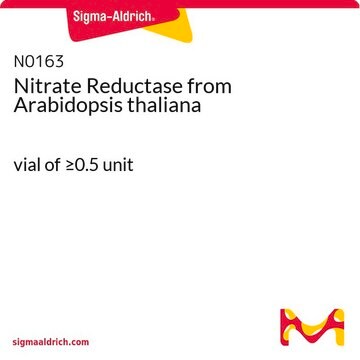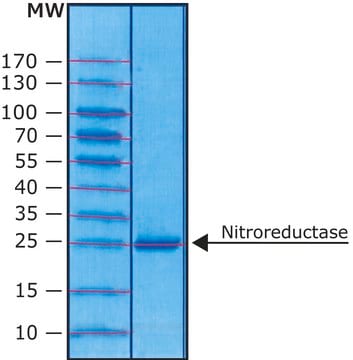N7265
Nitrate Reductase (NAD[P]H) from Aspergillus niger
lyophilized powder, ≥300 units/g solid
Synonym(s):
NAD(P)H:Nitrate oxidoreductase
Sign Into View Organizational & Contract Pricing
All Photos(1)
About This Item
CAS Number:
MDL number:
UNSPSC Code:
12352204
NACRES:
NA.54
Recommended Products
form
lyophilized powder
specific activity
≥300 units/g solid
shipped in
wet ice
storage temp.
−20°C
Looking for similar products? Visit Product Comparison Guide
General description
Nitrate reductase (NAD[P]H) is expressed in variety of organisms including bacteria, fungi, algae, and higher plants which have capacity to use nitrate as their sole source of nitrogen.Experimental studies show that nitrate reductase (NAD[P]H) is 180,000Daltons.
Biochem/physiol Actions
Nitrate Reductase (NAD[P]H) catalyzes the reduction of nitrate to nitrite. In addition, it also catalyzes the reduction of NADPH-cytochrome c, FADH2-nitrate. Nitrate reductase also has reduced methyl viologen-nitrate reductase activities.
Caution
light and moisture sensitive
Unit Definition
One unit will reduce 1.0 μmole of nitrate per min in the presence of β-NADPH at pH 7.5 at 25 °C.
Signal Word
Danger
Hazard Statements
Precautionary Statements
Hazard Classifications
Resp. Sens. 1
Storage Class Code
11 - Combustible Solids
WGK
WGK 3
Flash Point(F)
Not applicable
Flash Point(C)
Not applicable
Personal Protective Equipment
dust mask type N95 (US), Eyeshields, Gloves
Certificates of Analysis (COA)
Search for Certificates of Analysis (COA) by entering the products Lot/Batch Number. Lot and Batch Numbers can be found on a product’s label following the words ‘Lot’ or ‘Batch’.
Already Own This Product?
Find documentation for the products that you have recently purchased in the Document Library.
Customers Also Viewed
P C Allen et al.
Poultry science, 76(6), 822-827 (1997-06-01)
Two experiments were conducted to determine effects of diets containing n-3 fatty acids (n-3FA) from whole as well as ground flaxseed on the performance of broilers during coccidia infections. Diets were fed from 1 d of age through 3 wk
R L Warner et al.
Plant physiology, 91, 947-953 (1989-01-01)
Barley (Hordeum vulgare L.) has NADH-specific and NAD(P)H-bispecific nitrate reductase isozymes. Four isogenic lines with different nitrate reductase isozyme combinations were used to determine the role of NADH and NAD(P)H nitrate reductases on nitrate transport and assimilation in barley seedlings.
G Unden et al.
Molecular microbiology, 25(2), 205-210 (1997-07-01)
The FNR (fumarate and nitrate reductase regulation) protein of Escherichia coli is an oxygen-responsive transcriptional regulator required for the switch from aerobic to anaerobic metabolism. In the absence of oxygen, FNR changes from the inactive to the active state. The
W H Campbell
Cellular and molecular life sciences : CMLS, 58(2), 194-204 (2001-04-06)
Pyridine nucleotide-dependent nitrate reductases (NRs; EC 1.6.6.1-3) are molybdenum-containing enzymes found in eukaryotic organisms which assimilate nitrate. NR is a homodimer with an approximately 100 kDa polypeptide which folds into stable domains housing each of the enzyme's redox cofactors--FAD, heme-Fe
P Hilliquin et al.
Arthritis and rheumatism, 40(8), 1512-1517 (1997-08-01)
Nitric oxide (NO) is a free radical involved in inflammation and immune reactions. The presence of NO is usually assessed by assaying its degradation products, nitrite and nitrate. NO binds to thiol-containing proteins to form S-nitrosoproteins (S-NP). The aim of
Our team of scientists has experience in all areas of research including Life Science, Material Science, Chemical Synthesis, Chromatography, Analytical and many others.
Contact Technical Service


![Nitrate Reductase (NAD[P]H) From Pichia Pastoris, recombinant freeze-dried protein glass](/deepweb/assets/sigmaaldrich/product/images/859/572/ae8d80df-c6d0-4cce-a526-35f8e21ca729/640/ae8d80df-c6d0-4cce-a526-35f8e21ca729.jpg)









